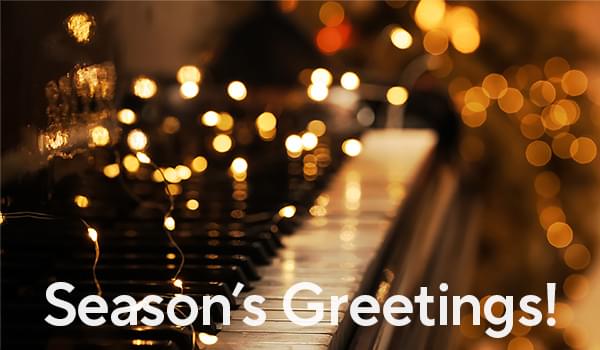This holiday season, we’re sharing the gift of music from one of this fall’s most memorable moments. Pianists Adam Tendler and Jenny Lin brought us an all-Philip Glass program, living up to their reputation as some of the most foremost Glass interpreters performing today.
Enjoy this selection from Philip Glass Mixtape: Celebrating the Composer’s 85th Birthday
Mad Rush
As performed by Adam Tendler | November 19, 2022 | Herbst Theatre
Program Note
Mad Rush
PHILIP GLASS (b. 1937)
In the fall of 1979 the 14th Dalai Lama paid a visit to New York City, and Philip Glass—who has described himself as a “Jewish-Taoist-Hindu-Toltec-Buddhist”— was asked to provide music for the Dalai Lama’s appearance in the Cathedral of Saint John the Divine. But there were stipulations in place even before Glass began to compose. The Dalai Lama’s schedule was uncertain, it was not clear exactly when he would arrive, and Glass was told that whatever music composed for that occasion should be “somewhat indefinite in length.”
Glass has noted wryly that such a stipulation was “not a problem” for him, and he composed a piece—originally for organ—that could be shaped into different lengths: expanded through its many repeats or cut off as the occasion demanded. Glass himself performed this music for the appearance of the Dalai Lama, and at that time it had no title—only later did it acquire the name Mad Rush. While Mad Rush was originally composed for organ, Glass has said that he is comfortable with it in its piano version, and he has performed it often as a piano piece.
The music begins quietly (Glass’ marking is Flowing) with a steady murmur of eighth-notes in 4/4 in the left hand, but in the fifth measure the right hand enters in triplets, and that play of two against three will continue throughout. Mad Rush is based on two themes, and Glass has noted that this music may be thought of as “the play of the wrathful and peaceful deities of Tibetan Buddhism,” but listeners should not expect the sort of sonata-form turbulence that such a contrast of themes might imply. Harmonies shift, colors evolve, rhythms grow more complex, but Mad Rush retains is calm character throughout, and the music finally reaches a peaceful conclusion, a conclusion well suited to welcome a religious leader who has made peace the core of his message.
